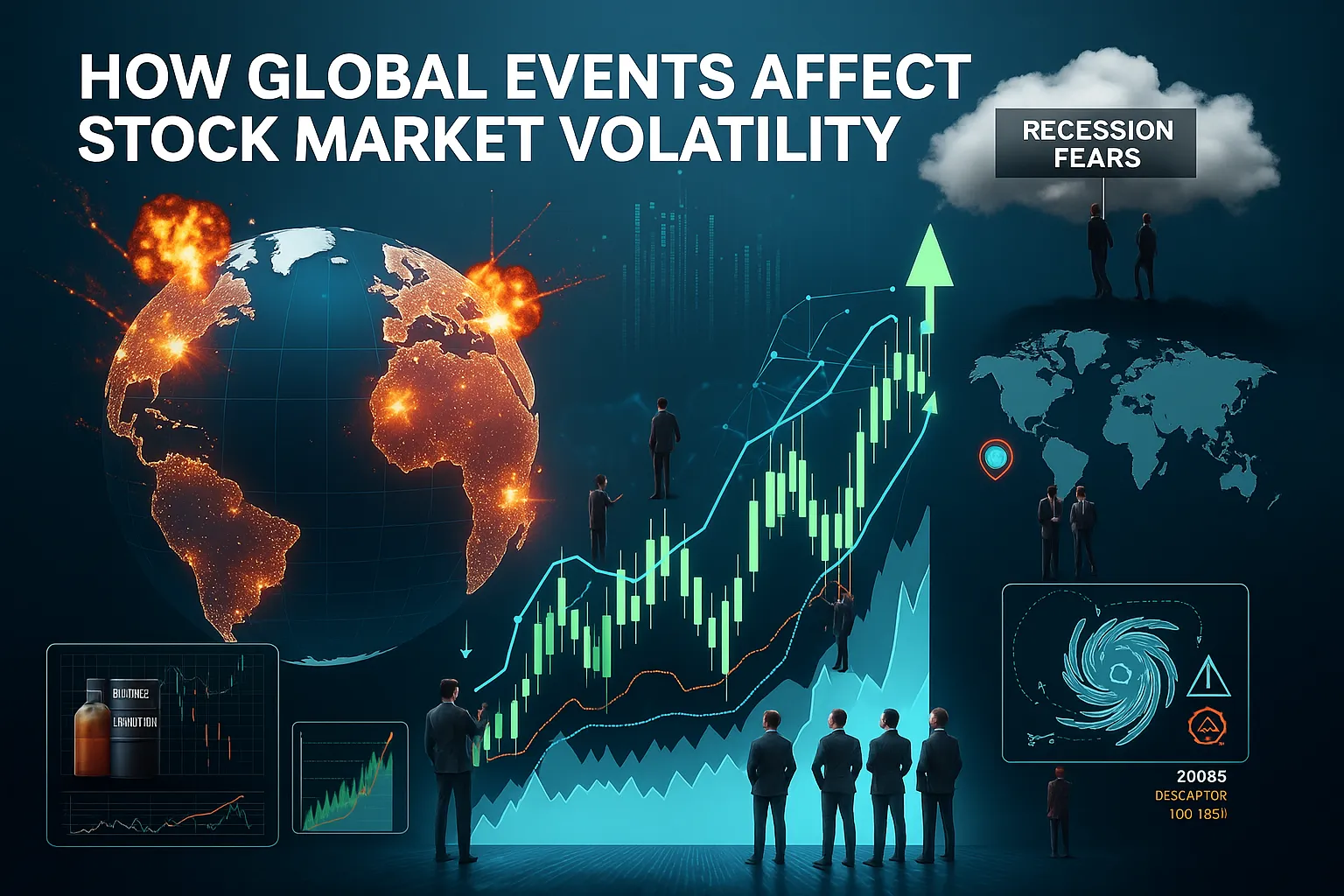Introduction
Global events—such as wars, elections, natural disasters, or central bank decisions—often trigger stock market volatility by shaking investor confidence. Understanding these impacts helps traders and investors make smarter decisions and manage risks effectively. This article explores how global events drive market swings in 2025 and offers strategies to navigate volatility. For related insights, explore Mutual Funds vs Stocks, De-Dollarization in 2025, and AI in Finance.

Why Global Events Influence the Stock Market
Stock markets are deeply tied to global economic, political, and social developments. Even distant events can send shockwaves worldwide.
- Investor Psychology: Fear and uncertainty lead to panic selling, while positive news sparks rallies.
- Supply and Demand: Trade disruptions or shortages affect stock prices.
- Capital Flows: Investors shift to safe-haven assets like gold or bonds during crises.
- Globalization: Companies operate globally, so regional disruptions impact markets worldwide.
Major Global Events That Drive Market Volatility
1. Geopolitical Tensions and Wars
Conflicts like the Russia-Ukraine war impact oil, gas, defense, and supply chains, causing sell-offs and commodity spikes.
2. Elections and Political Changes
Elections influence policies on taxation, trade, or regulation, creating short-term volatility. U.S. elections are particularly impactful.
3. Natural Disasters and Pandemics
Events like earthquakes or pandemics (e.g., COVID-19) disrupt production and demand, causing sharp market drops.
4. Central Bank Policies and Interest Rates
Decisions by the Federal Reserve or other central banks affect borrowing costs and stock prices. Rate hikes often lead to market declines. See more in De-Dollarization.
5. Trade Wars and Supply Chain Disruptions
Disputes like the U.S.-China trade war raise tariffs and impact tech and semiconductor stocks.
Historical Examples of Market Reactions
- 2008 Global Financial Crisis: Triggered by the U.S. housing bubble, the S&P 500 lost nearly 50%.
- COVID-19 Pandemic (2020): Lockdowns caused a rapid crash, followed by a stimulus-driven rebound.
- Russia-Ukraine Conflict (2022): Energy and defense stocks surged amid broader market volatility.
- U.S. Elections (2016 & 2020): Policy expectations on trade and taxes drove sharp market reactions.
How Traders and Investors Can Manage Volatility
Diversification Across Sectors and Regions
Spread investments across industries and regions to reduce risk. Explore Mutual Funds vs Stocks for diversification strategies.
Use Stop-Loss Orders
Automatically sell stocks if they fall below a set price to limit losses.
Hedge with Safe-Haven Assets
Invest in gold, U.S. Treasury bonds, or stable currencies during uncertainty.
Stay Updated with Reliable News Sources
Follow trusted financial news to act before major market moves.
Focus on Long-Term Growth
Markets typically recover over time, rewarding patient investors.
Learn how AI in Finance can enhance investment decisions.
The Link Between Globalization and Market Volatility
Globalization makes markets interconnected. A supply issue in Taiwan can impact tech stocks in the U.S., Europe, and India, highlighting the global nature of modern markets.
Key Takeaways for Traders
- Global events significantly influence stock market swings.
- Wars, elections, disasters, and central bank policies drive volatility.
- Diversification and hedging turn volatility into opportunity.
Conclusion
Stock market volatility is a natural response to global uncertainty. Events like wars, elections, and central bank decisions influence investor confidence and corporate earnings. By staying informed and using risk management strategies like diversification and hedging, investors can navigate volatility and find opportunities in 2025.
